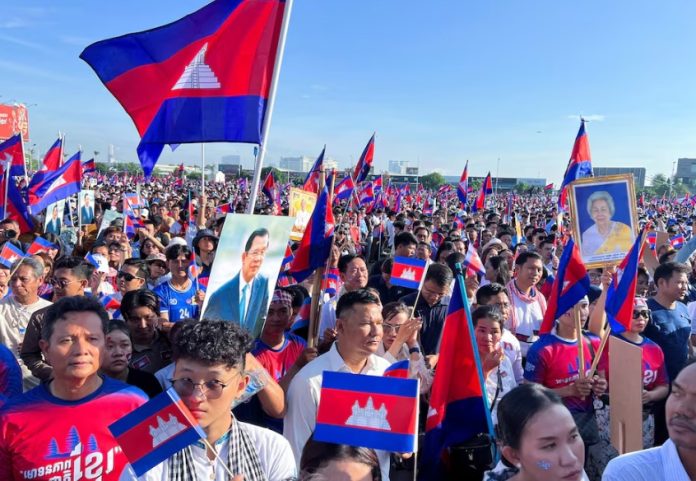Thousands of Cambodians joined a “solidarity march” in the capital Phnom Penh on Wednesday amid growing tensions on the border with neighbouring Thailand, Asian media reported on Wednesday.
The march was organised to express support for the Cambodian government and armed forces in the ongoing border dispute with Thailand, triggered by the death of a Cambodian soldier last month.
About 150,000 people took part in the march, including Deputy Prime Minister Hun Many, who led the rally. Speaking to marchers, Hun said Cambodians would not remain silent if Cambodia’s honour and territorial integrity were insulted.
“We will stand together in spirit to support the royal government of Cambodia and our national forces in defending our territorial integrity, protecting our national interests and safeguarding peace in the country,” he added. However, “we choose a peaceful solution to all of Cambodia’s problems based on the law,” he said.
Thailand has increased its military presence along the disputed border with Cambodia in response to a similar troop build-up on the other side of the border, said Thai Defence Minister and Deputy Prime Minister Mr. Phumtham Wechayachai, indicating that tensions between the two Southeast Asian countries remain high after a military skirmish on May 28, in which Cambodian border guards were killed.
According to Minister Phumtham, Phnom Penh rejected Bangkok’s proposals for de-escalation during bilateral talks on June 5.
Ban on fruit
Cambodia imposed a ban on Thai fruit and vegetables entering through the Ban Hat Lek border crossing in Klong Yai district, Trat province, causing delays and concern among Thai transporters. The incident occurred on Tuesday and led to the accumulation of about 30 trucks carrying Thai products at the border.
The reasons why the Cambodian side imposed the ban remain unclear, but it can be assumed that it is related to the protection of local producers or trade disputes between the countries.
The situation on the border between Thailand and Cambodia remains tense. Further talks scheduled for September will be an important step in the search for a peaceful resolution to the border dispute, which has a long history and has an impact on regional security. The outcome of these talks will be closely monitored both within Thailand and Cambodia and by the international community. Failure to make progress on border issues could lead to further escalation of tensions in the region.
Territorial issue
Territorial disputes between Cambodia and Thailand began in 1907, when Cambodia was under French protectorate, France signed a treaty with Siam (now Thailand) and transferred several territories to Cambodia, including the Preah Vihear temple, which remains a source of dispute to this day.
In 1962, the International Court of Justice ruled that the temple belonged to Cambodia. Thailand did not fully accept this decision, claiming that access to the temple was through its territory. Since then, both sides have regularly accused each other of violating the border.
In 2008–2011, the conflict flared up again: there were skirmishes, soldiers were killed, and both countries built up their forces on the border. The conflict was stopped with the help of international mediators.
Development of the conflict in 2025
It all began in February with an incident at the Prasat Ta Muen Thom temple. Cambodian tourists sang the national anthem in the disputed territory, which provoked a sharp reaction from the Thai military. This event triggered a new round of tensions.
In March, calls to restrict Cambodia’s access to water and energy began to spread on Thai social media, along with ideas to build a wall along the border. The Cambodian side accused Thailand of provocative rhetoric.
In May, a brief armed clash broke out in the Chang Bok area (Ubon Ratchathani province), with about 25 minutes of gunfire between the two countries’ military forces. A Cambodian soldier was killed. Both sides blamed each other for starting the conflict. Cambodia claims that the soldiers were on its territory. Thailand insists that they violated the border.
